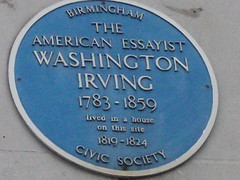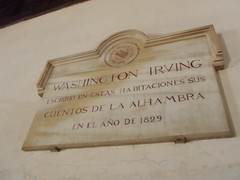Washington Irving
Commemorated on 6 plaques
Washington Irving 1783-1859 American writer lived here
8 Argyll Street, London, United Kingdom where they lived
The American essayist Washington Irving, 1783-1859 lived in a house on this site 1819-1824
12 Calthorpe Road, Edgbaston, Birmingham, United Kingdom where they lived
The Argent Centre The Argent Centre is built on the site where Washington Irving conceived the Rip Van Winkle story. Designed by J.G. Bland for a gold pen manufacturer in 1863 employing 250 people. Florentine window tracing and multi coloured brick fascias make this Grade II listed building and excellent example of Italianate and polychromatic architecture popular in the 19th century. Directors had steam removed from the boilers for a Turkish bath and could also fence, play billiards, chess or recline on luxurious couches which lined their rooms. The premises were converted into small business units by Midland Industrial Assocation in 1988.
The Argent Centre, Legge Lane, Jewellery Quarter, Birmingham, United Kingdom where they conceived the Rip Van Winkle story
Washington Irving Escribio en estas habitaciones sus Cuentos de la Alhambra en el ano de 1829
The Emperor's Chambers - Nasrid Palaces - The Alhambra, Granada, Spain where they stayed (1828)
Irving House formerly the home of Washington Irving Jnr.
11 Commerce Street, New York, NY, United States where they lived
Kentucky Historical Marker #1681
Louisville's Steamboat Era. River navigation in 18th century was by flatboat and keelboat. First steamboat, NEW ORLEANS, arrived in Louisville in autumn of 1811. City soon became steamboat center with six lines operating here. Hundreds of these boats were built in area. Wharf teemed with traffic through Civil War. Eight U.S. presidents arrived on this wharf or "levee." (Reverse) Visitors at Louisville Wharf James Monroe - June 1819 Andrew Jackson - June 1819 Alexis de Tocqueville - Dec. 1831 Washington Irving - Sept. 1832 Abraham Lincoln - Sept. 1841 Charles Dickens - Apr. 1842 Walt Whitman - Feb. 1848 Ralph Waldo Emerson - June 1850 Oliver W. Holmes - Sept. 1855 Herman Melville - Jan.1858
At the Wharf, 4th St., Louisville, KY, United States where they visited (1830)






